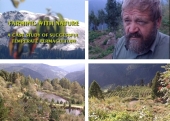
 4
4




 Yacouba’s two main techniques are the Zaï hole & the Contour Stone Bund (Cordons pierreux?). In the most basic sense, Zaï holes are ~1ft[sup]3[/sup] pits packed with manure or compost to improve soil and the CSBs are rows of fist-sized stones for water management (when it actually rains). I suggest reading up on it for further details.
Yacouba’s two main techniques are the Zaï hole & the Contour Stone Bund (Cordons pierreux?). In the most basic sense, Zaï holes are ~1ft[sup]3[/sup] pits packed with manure or compost to improve soil and the CSBs are rows of fist-sized stones for water management (when it actually rains). I suggest reading up on it for further details.I found the movie here: https://www.journeyman.tv/film/5581




The ultimate goal of farming is not the growing of crops, but the cultivation and perfection of human beings. - Masanobu Fukuoka








.




soil wrote:
is this the guy who says you must plant the rain first?
Idle dreamer
 3
3




People are the keystone species of the planet.





















 )
)







Jen0454 wrote:
Thanks for this one Ludi !
It puts a lot into perspective for me.
I feel small village, permaculture lifestyle to be the "answer"...




With agriculture came the gross social and sexual inequality, the disease and despotism, that curse our existence.
It’s almost inconceivable that Bushmen, who eat 75 or so wild plants, could die of starvation the way hundreds of thousands of Irish farmers and their families did during the potato famine of the 1840s.
modern Greeks and Turks have still not regained the average height of their distant ancestors
it was the crowding, rather than agriculture, that promoted disease, but this is a chicken-and-egg argument, because crowding encourages agriculture and vice versa.
Women in agricultural societies were sometimes made beasts of burden. In New Guinea farming communities today I often see women staggering under loads of vegetables and firewood while the men walk empty-handed.
"Solve world hunger . . . tell no one." The, the, the, . . . THE GRINCH!




Seed the Mind, Harvest Ideas.
http://farmwhisperer.com
 3
3




carl sagan returns wrote:Doing some Desert Permaculture research I was reading up on desertification when I stumbled upon natural “counter-desertification” techniques employed by Yacouba Sawadogo. The story goes that Mr. Sawadogo, a native of Burkina Faso, a land-locked country in West Africa bordering the Sahara, was able to restore ~50 acres of arid land back to a fruitful landscape. Apparently his techniques attracted the attention of Dr. Chris Reij of VU in Amsterdam and there is a documentary all about it from 1080 films out of the UK: http://www.1080films.co.uk/project-mwsd.htm
I tried to figure out a way to watch it without ordering from their website but haven’t had any luck yet. So then I went looking for literature from VU and I managed to find this…
http://www.ifpri.org/sites/default/files/publications/ifpridp00914.pdf.
The pdf provides a little more info than the wikipage but it would still be nice to see real footage of Mr. Sawadogo’s PC site among other things.
So from what I’ve read (section 3 p.4-Yacouba’s two main techniques are the Zaï hole & the Contour Stone Bund (Cordons pierreux?). In the most basic sense, Zaï holes are ~1ft[sup]3[/sup] pits packed with manure or compost to improve soil and the CSBs are rows of fist-sized stones for water management (when it actually rains). I suggest reading up on it for further details.
So finally I came here to find out the real scoop on this guy and was surprised that the forum-search-option revealed not even a mention of this guy. Has anyone here ever heard of Yacouba Sawadogo?
Aside from these methods I have also seen both parts (I & II) of Geoff Lawton’s “Greening the Desert,” and found that to be highly informative and inspiring, and was hoping to get the same out of this new film. What do you guys think Geoff Lawton would have to say about these methods? Does anyone think he would incorporate any of Yacouba’s ideas into the methods he is currently using to counter desertification in Jordan? If so, then how?
CSR
 2
2




Rick Valley at Julie's Farm




Invasive plants are Earth's way of insisting we notice her medicines. Stephen Herrod Buhner
Everyone learns what works by learning what doesn't work. Stephen Herrod Buhner

|
Your mind is under my control .... your will is now mine .... read this tiny ad
The new permaculture playing cards kickstarter is now live!
https://www.kickstarter.com/projects/paulwheaton/garden-cards
|





